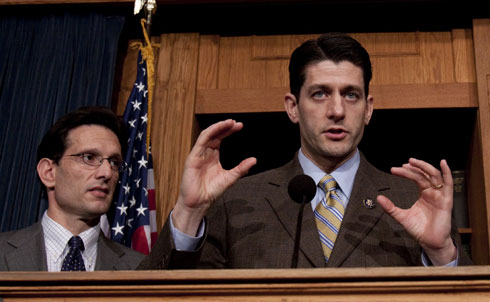
The GOP’s recently elected “young guns” aren’t necessarily young—but they are gunning to become the next generation of Republican leaders in the House, Senate and in the states.
While some of the young guns on our list are Tea Party-backed and others, like Eric Cantor, have tried to rein in the breakout movement, they all have similar goals in their sights: repealing healthcare reform, cracking down on illegal immigration, cutting social services and extending tax cuts for the wealthiest.
Meet the Republican Party’s rising stars.
Credit: AP Images
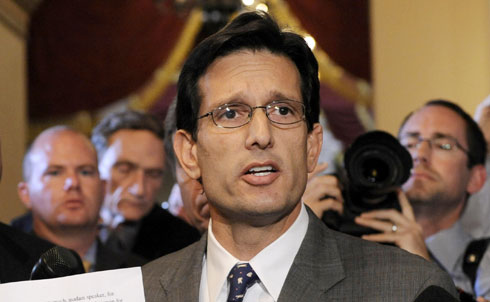
At 39, Eric Cantor is the youngest member of the House Republican leadership, making him a bonafide “young gun.” The House representative for Virginia’s 7th district since 2001, Cantor will soon assume the Majority Leader position.
As Ari Berman writes in the latest issue of The Nation, Cantor rose through the GOP ranks “through a mix of fundraising prowess, media savvy and party devotion.” According to Berman, Cantor’s on a fast track to becoming Speaker.
At the top of Cantor’s small government agenda is the repeal of “Obamacare,” along with other public services. He has asked the public to vote on which government programs they’d like to cut, and has pledged to “put Uncle Sam on a diet.”
Unlike other young guns on this list, Cantor became popular without the support of the Tea Party. In fact, Cantor has spoken out against the creation of a Tea Party caucus in the House and supported Texas Representative Jeb Hensarling over Tea Party favorite Michelle Bachmann for chair of the House Republican Congress.
But Berman predicts that Cantor will “avoid making too many waves” in the House, and will instead continue to build up his reputation by opposing the Democrats’ efforts to provide basic services to American citizens.
Credit: AP Images
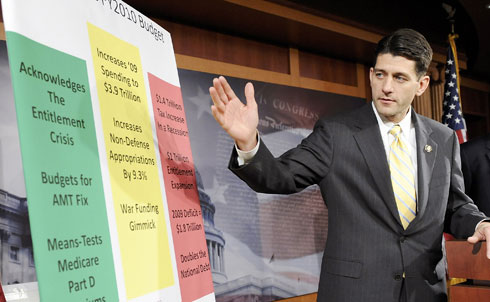
The Nation’s John Nichols describes 40-year-old Congressman Paul Ryan as “handsome, good-natured and blessed with an ability to reduce the most complicated fiscal issues to conservative talking points that just happen to echo Wall Street’s wish list.” In contrast to Rand Paul and Michelle Bachmann, Ryan’s politeness and confident bearing evokes an image of “Reaganesque” Republicanism.
However, the policies that Ryan stands behind are the Tea Party’s, too—even though Ryan emphasizes economics and privatization of social services over immigrant-scapegoating and gay-bashing. According to Nichols, Ryan’s “Roadmap for America’s Future” would begin the process of privatizing Social Security, replace Medicare as we know it and most of Medicaid with a voucher program, abolish the State Children’s Health Insurance Program, abolish various corporate and estate taxes and provide across-the-board tax cuts to even the richest Americans. Perhaps most radically, Ryan will explore flat tax and consumption tax models that would do away with progressive taxation altogether.
Credit: Reuters Pictures
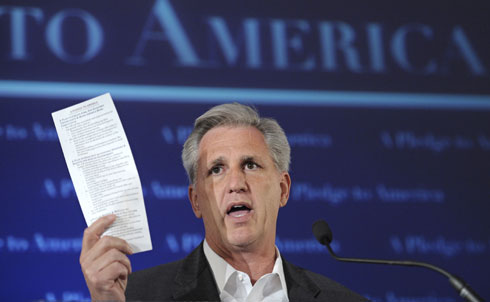
Incoming GOP House whip Kevin McCarthy’s greatest contribution to Republican rhetoric as of late is his role as key author of the dubious Pledge to America. As John Nichols points out in his appearance on Grit TV, the dramatic cuts to the federal budget that the Pledge to America calls for can only come from one place: Social Security.
As The Nation’s Sasha Abramsky writes in the latest issue of the magazine, “McCarthy in many ways typifies the new House GOP” even though he has “lived and breathed politics for decades.” Abramsky points out that McCarthy’s strong fundraising abilities and youthful energy helped endear him to the “deeply conservative cadre of state legislators.”
As House whip, however, McCarthy will have his job cut out for him. Abramsky predicts that McCarthy will not want to alienate voters and put the GOP majority at risk in 2012 by hewing too far to the right, and will thus have the task of reining in his party’s more extreme elements. “He might well succeed; he’s clearly talented,” says Abramsky, “but there’s at least a chance it will end up proving a bridge too far.”
Credit: AP Images
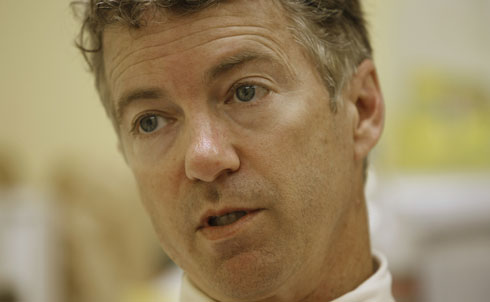
At 47 years old, libertarian-leaning Tea Partier Rand Paul is not particularly young, but he is new to politics, describing himself on his official website as “a career doctor, not a politician.” The problem with Paul starts when he uses his credentials as a physician to buttress his conservative views on issues such as healthcare, abortion and immigration, as he said he’d do as the newly-elected senator from Kentucky.
Paul believes that “life begins at conception” and opposes any form of federal funding for abortion. Paul also wants to prescribe a free market fix for America’s healthcare woes, and condemns the government “wield[ing] its heavy hand” in healthcare issues.
During Paul’s campaign, he promoted himself as “the people’s candidate,” but according to the Center for Responsive Politics, he actually had $180,000 of Wall Street money fueling his run for Senator, even though he opposed bailouts. Either way, while Paul enjoys his popularity among Tea Partiers, progressives aren’t swallowing this doctor’s bitter pill.
Credit: AP Images
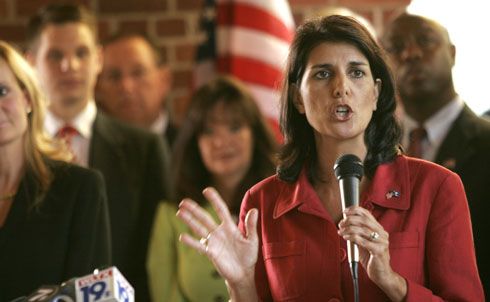
On November 2, Tea Party-backed Nikki Haley defeated Democrat Vincent Sheehan to become South Carolina’s first woman and first Indian-American governor. As one of Sarah Palin’s “Mama Grizzlies,” Haley branded herself as a fiscally conservative, pro-business, anti-“Obamacare” candidate, and successfully deflected allegations of marital infidelity during her campaign.
As The Nation’s Sarah Jaffe argues, although the Tea Partiers like to point to Haley’s Sikh background as a sign of racial diversity in their ranks, “underneath the surface, Haley is no kinder, gentler Republican. Among the bills she’s co-sponsored this legislative session are an anti-union bill and one that would make it more difficult for women to obtain an abortion.”
During her governorship, Haley is expected to push for stepped-up immigrant deportation, oppose healthcare reform as “unconstitutional,” work to reduce the size of government and relax restrictions on carrying concealed firearms.
Credit: AP Images
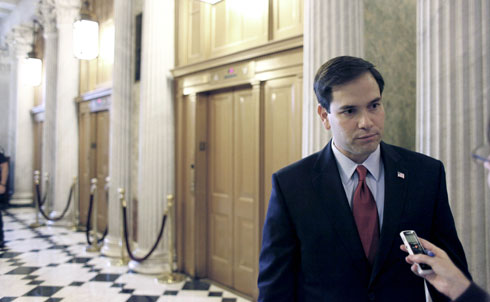
Another Tea Party-backed Republican advocating limited government and aiming to take down healthcare reform is Florida’s Marco Rubio, who recently beat opponents Kendrick Meek and Charlie Crist to win a seat in the Senate.
During his election night victory speech, Rubio said that “Washington…is a place that literally changes people, and within a short period of time, they forgot why they even ran. And so, tonight, I ask for your prayers for me and for my family that we will not change…that we will always remember the things we cared about on this night.”
If Rubio follows through on his promises, he will work to permanently the Bush tax cuts and repeal Obama’s healthcare reforms.
Credit: AP Images
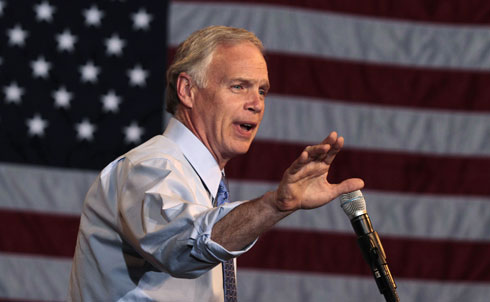
While the millions of dollars that other self-funded GOP candidates like Linda McMahon and Meg Whitman spent on their campaigns failed to secure their victories, self-financed multi-millionaire Ron Johnson is one Republican who was able to buy his way into office in 2010.
In a crushing loss for progressives, Johnson narrowly beat progressive Democrat Russ Feingold, despite the fact that Feingold actually raised more money than Johnson—leading to the most expensive Senate race in Wisconsin history, topping out at more than $35 million.
In Washington, Johnson will support Senator Jim DeMint’s earmark ban, which would prevent Republicans, and not Democrats, from requesting earmarks in spending bills for two years—an issue that is dividing the GOP. Unsurprisingly, Johnson is also committed to fighting illegal immigration, repealing healthcare reform and pursuing an anti-choice agenda. While Feingold was a strong advocate for environmental protection and a founding member of the Wilderness and Public Lands Caucus in the Senate, Johnson is an outright climate change denier and even went so far as to defend BP after the Gulf spill.
Credit: AP Images
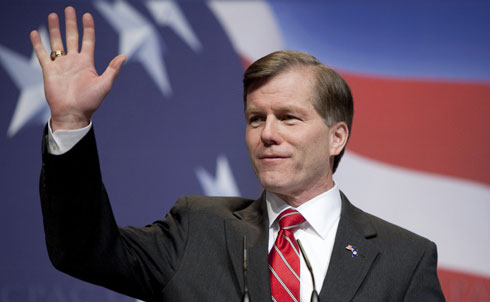
Bob McDonnell has been Virginia’s Governor for less than a year, but he has already become a prominent figure in the GOP. Earlier this year, McDonnell spoke at the Conservative Political Action Conference about a wave of young people “retaking” the country.
McDonnell’s gubernatorial campaign touted his 21 years of service in the military and his tough-on-crime policies, but McDonnell wasn’t always about just honor and service. In his 1989 master’s thesis at the evangelical Regent University, McDonnell called working women "detrimental" to the family; demanded that government "restrain, punish, and deter" homosexuality; and ridiculed "conventional folklore about the separation of church and state." As Virginia’s Attorney General, McDonnell sought to follow through on this agenda in his thesis when he introduced thirty-five measures to restrict abortion rights and championed tax policies to protect the traditional husband as sole breadwinner for families.
Even though McDonnell has been careful to build up his reputation as a jobs- and economy-focused “federalist governor” rather than as a defender of traditional family values, The Nation’s John Nichols took issue with the Governor’s announcement of April as "Confederate History Month" in the old dominion state: according to Nichols, McDonnell crudely omitted slavery as a cause of the civil war.
Research for this slide show provided by Joanna Chiu.
Credit: Reuters Pictures


